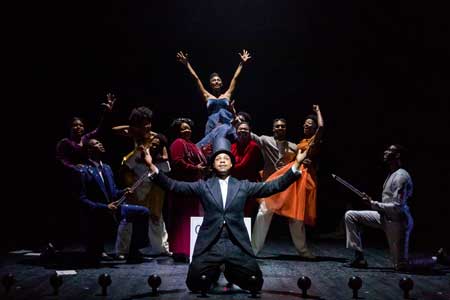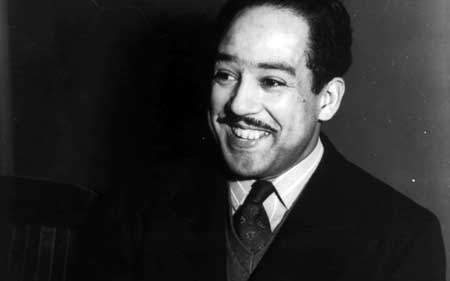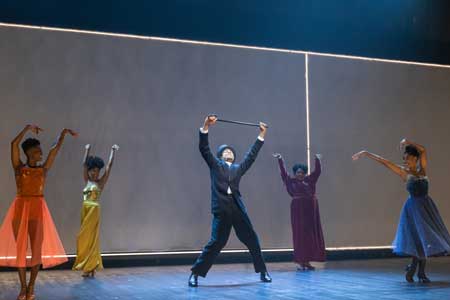Musical, Play, Performance (2018)
Adapted from Langston Hughes’ poem
by Davóne Tines and Michael Schachter
Music by Michael Schachter
Directed by Zack Winokur
American Repertory Theater
Loeb Drama Center, Harvard University
Cambridge, MA
August 31 – September 23, 2018
Music Director: Jaret Landon; Choreography: Chanel DaSilva
Scenic and Costume Design: Carlos Soto; Lighting Design: John Torres; Sound Design: Kai Harada
With Davóne Tines (The Black Clown), Sumayya Ali, Malcolm Armwood, Daniel Bellomy, Dawn Bless, Lavon Fisher-Wilson, Lindsey Hailes, Evan Tyrone Martine, Hardon Dishon Milton, Brandon Michael Nase, Amber Pickens, Jamar Williams, Haileee Kaleem Wright

Photo: Maggie Hall
Courtesy of American Repertory Theater
What a moving and totally engaging treat this is. As fellow students (who graduated from Harvard College in 2009), co-writers Davóne Tines and Michael Schachter began to hatch the idea of adapting Langston Hughes’ long poem The Black Clown as a musical theater piece. Having developed it at the American Repertory Theater over the past several years, the creators now show it in its full, glorified form; it is a masterpiece in several dimensions.

Photo: Library of Congress
The masterpiece of another great African-American artist from roughly the same era as Hughes, Jacob Lawrence, comes to mind: The Great Migration, a series of small paintings done on hardboard that Lawrence created to commemorate the movement of African-Americans from South to North in the early twentieth century. There is something both grand and poetic about that work – its elements literal and down to earth but its scope epic. (The entire work was exhibited at the Museum of Modern Art in New York in 2015 and the group Step Afrika! performed a dance-theater work based on the series at ArtsEmerson last spring.)
Hughes’ poem, which forms the framework of this stellar theater piece, has the same quality – a noble essence that communicates, in its collection of detailed images, a sense of the scope of African-American life as it has made its way forward from the oppression of slavery through continuing challenges towards a gradually evolving sense of ennobled self. The potency of the work is the density of its prevailing image – that of the African-American as clown, as a presence which has been forced to stoop to white prevalence, regarded as humorously submissive, not permitted to assume its own deservedly self-possessed stature. The transcendence of this faux comic sensibility is the heart and soul of this brave and bold poem, and of the exquisite rendition given here in song and dance which brings that heart and soul into sharp focus upon the stage.
The Black Clown by Langston Hughes
This is not a play or musical in any conventional sense, but more a theater oratorio, an embellished song and dance accompaniment for the wonderful soloist who bears the weight of the vocal rendering of the poem.
Davóne Tines is not only a talented writer and co-architect of this stunningly good work, but is also its vocal star, his voice forming the backbone of the work’s musical presence. If baritone voices can be rich in tone, Tines’ is bathing in wealth, its reverberant echoings molasses-rich, dark, penetrating, and sweet.
Though indeed Tines’ voice is able to carry the show, the vocal and musical arrangements done by Michael Schachter enrich and frame the evocations of the soloist with a panoply of rhythms, harmonies and variations that turn the yearning reach of the solo baritone into a broad and festive celebration of the spirit.
The music is jazzy, bluesy and incredibly varied, and, while highly inventive, remains historically context-appropriate. The music is remarkably faithful to the spirit of the time during which Hughes wrote his poem – the early 1930s – while the production couches it in an abstractly modernist staging that distills and transmits that historical essence with streamlined gracefulness.

Davóne Tines, Dawn Bless, Amber Pickens
in “The Black Clown”
Photo: Maggie Hall
Courtesy of American Repertory Theater
The choreography by Chanel DaSilva is superbly good. From the outset, the urgings, creepings, gyrations and weavings of the ensemble – a remarkably talented bunch of excellent singers and dancers – conveys the gesture and rhythm of Hughes’ poem while embellishing the resounding declamation of it through Tines’ voice. Collectively, the production creates a set of vivid scenes that deliver an evolving sense of ennoblement and release, through voice and gesture, in each part of the poem brought forth.
The wit of the piece is its willingness to focus intelligently on particular elements of the poem, not to have it declaimed mechanically and serially, but to bring out its highlights and gestures, to urge the poem forth from the stage rather than merely to repeat it. The result is full of beat, bop and excitement, and one wants, by the end, to go back and relive it by reading the poem again and again. That urging represents a truly great evocation of a poem.
Costumes by Carlos Soto are at times black and white, and at other times colorful, elegantly and tastefully designed to give the abstractness of the set a little poke in the ribs.
Lighting by John Torres is dramatic and sometimes jarring, but that seems appropriate somehow. The rollicking proscenium lights call to mind the Apollo Theater, while, alternatively, the singular dour bulb creating silhouettes from the back of the stage pokes into ones sight and creates a yearning and sighing in the midst of the segments about the fraught and ambiguous periods after the Civil War.
A rollicking dance with a noose and with chains makes one laugh and cry in a blink, and the sight of the protagonist trying to climb a ladder that continually slips beneath him into the cavern of the stage below, like Sisyphus’ endlessly falling rock, breaks one’s heart.
There is so much to love here, and it is conveyed in a relatively short time – it all goes by in seventy minutes. But what a seventy minutes it is, a beautifully conceived and executed work, at once a brilliant entertainment and a deep evocation, a lyrical gift about the trials and hopes, the signficant challenges and the vivid blessings, of the African-American experience.
Overall: Exquisitely good. Don’t miss it.
– BADMan
Charlie- what a magnificent review- the writing, the rich historical context, the detailed observations of voice, music and movement make this a stunning piece of writing. I’ll try to see it for sure!